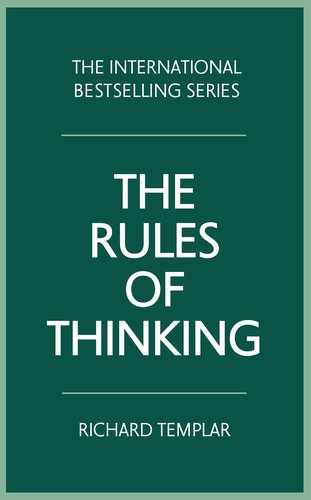Most problems have more than one solution. If I’m wearing a coat and the weather heats up so I start sweating, I could cut the sleeves off the coat to cool myself down. It’s an answer, but that doesn’t make it the best one. If I thought about it for a bit longer, it might occur to me to remove the coat.
Your money problems, or your work dilemma, or the fact you and your kids keep shouting at each other, or the question of what to do with your mum now she can’t really live alone any more, also have more than one solution. And the best one won’t necessarily be the one you think of first.
The first answer you come up with is really useful, mind you. I alluded to this earlier – having a plan B is fantastic for taking the pressure off, which frees your mind up to think more creatively. So definitely make a note of any solution you think of, until a better one materialises. Even if that better one still only really warrants becoming the new plan B.
Listen, it can take time to come up with a really good answer to your problem. Don’t expect it to be instant or you’ll assume the instant answer is the best one. That’s a recipe for muddling through life. Every time you hit difficulties, you take an option that’s good enough but no more. Is that really how you want to live? Do you think that’s the route to success and happiness?
Sure, when the problem is a minor one, it may not matter that much. But remember, we’re getting into good thinking habits. If you train your mind to think the best way every time, it will think the best way when it really matters. And the best way to think is the one that leads to the best – not the quickest – outcome.
So how do you know when you’ve found the real, best solution? There’s no simple answer but there are pointers. You’re looking for the one that ticks the right boxes – not just the most boxes, but the ones that matter most. So for example, when you’re deciding what to do with your elderly mum, her happiness is (I hope) an essential box to tick. Solutions that don’t provide for this aren’t going to make the grade. You’ll need a list (mental or physical) of the essential components of a good solution, and also the preferable ones.
And adopt this principle: whatever solution you come up with, say to yourself, ‘That’s a good starting point. Now where can I go from here?’ In other words see every idea as a beginning and not an end point. Always look for ways to develop your first thought into something even better. Assume it can be improved on. Just don’t let this take you down a one-way tunnel. Remember there might be other ideas, other jumping-off points, that would take you in a different direction and that are also worth considering. If there’s room for improvement, it can’t be the best solution yet.
Sometimes, if you’re lucky, you’ll just know when you find the right solution. Even so, although it might feel like a gut response, your gut will have been informed by the thinking you’ve done before. That’s how it recognises the right answer when it sees it.
SEE EVERY IDEA AS A BEGINNING AND NOT AN END POINT
